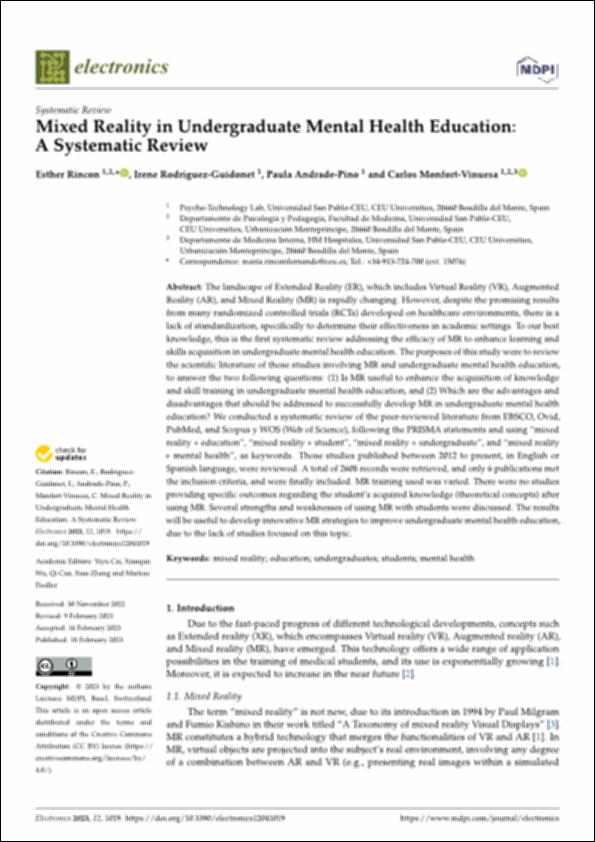Por favor, use este identificador para citar o enlazar este ítem:
http://hdl.handle.net/10637/14856Mixed Reality in Undergraduate Mental Health Education: A Systematic Review
| Título : | Mixed Reality in Undergraduate Mental Health Education: A Systematic Review |
| Autor : | Rincón Fernández, María Esther Rodriguez Guidonet, Irene Andrade Pino, Paula Monfort Vinuesa, Carlos |
| Materias: | Mixed reality; Education; Undergraduates; Students; Mental health |
| Editorial : | MDPI |
| Citación : | Rincon, E.; Rodriguez-Guidonet, I.; Andrade-Pino, P.; Monfort-Vinuesa, C. Mixed Reality in Undergraduate Mental Health Education: A Systematic Review. Electronics 2023, 12, 1019. https://doi.org/10.3390/electronics12041019 |
| Resumen : | The landscape of Extended Reality (ER), which includes Virtual Reality (VR), Augmented Reality (AR), and Mixed Reality (MR) is rapidly changing. However, despite the promising results from many randomized controlled trials (RCTs) developed on healthcare environments, there is a lack of standardization, specifically to determine their effectiveness in academic settings. To our best knowledge, this is the first systematic review addressing the efficacy of MR to enhance learning and skills acquisition in undergraduate mental health education. The purposes of this study were to review the scientific literature of those studies involving MR and undergraduate mental health education, to answer the two following questions: (1) Is MR useful to enhance the acquisition of knowledge and skill training in undergraduate mental health education, and (2) Which are the advantages and disadvantages that should be addressed to successfully develop MR in undergraduate mental health education? We conducted a systematic review of the peer-reviewed literature from EBSCO, Ovid, PubMed, and Scopus y WOS (Web of Science), following the PRISMA statements and using “mixed reality + education”, “mixed reality + student”, “mixed reality + undergraduate”, and “mixed reality + mental health”, as keywords. Those studies published between 2012 to present, in English or Spanish language, were reviewed. A total of 2608 records were retrieved, and only 6 publications met the inclusion criteria, and were finally included. MR training used was varied. There were no studies providing specific outcomes regarding the student’s acquired knowledge (theoretical concepts) after using MR. Several strengths and weaknesses of using MR with students were discussed. The results will be useful to develop innovative MR strategies to improve undergraduate mental health education, due to the lack of studies focused on this topic. |
| URI : | http://hdl.handle.net/10637/14856 |
| Derechos: | http://creativecommons.org/licenses/by-nc-nd/4.0/deed.es OpenAccess |
| ISSN : | 2079-9292 |
| Fecha de publicación : | 18-feb-2023 |
| Centro : | Universidad San Pablo-CEU |
| Aparece en las colecciones: | Psicología |
Los ítems de DSpace están protegidos por copyright, con todos los derechos reservados, a menos que se indique lo contrario.


